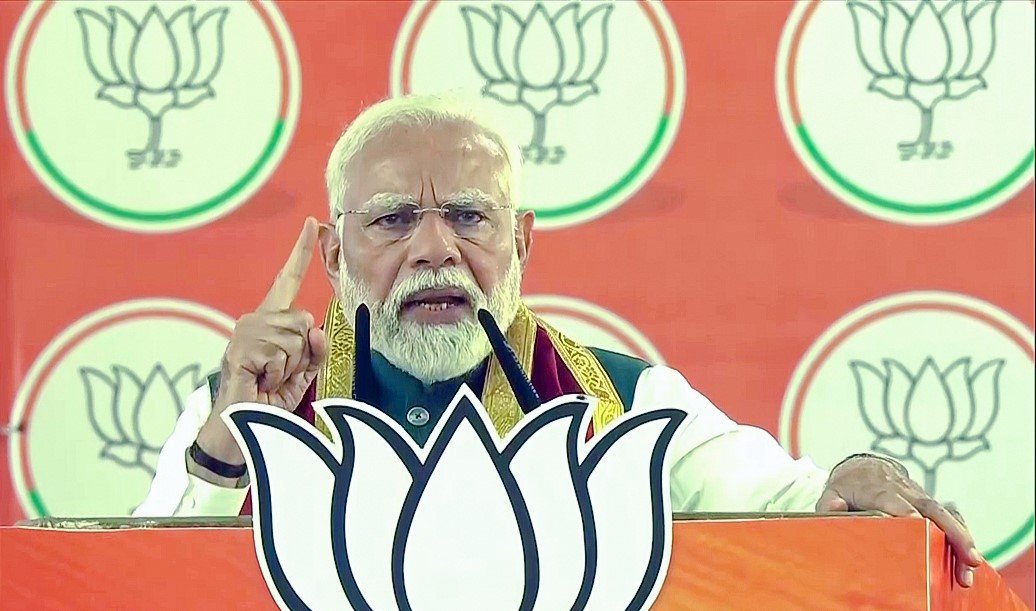
PM Modi Urges Pakistan Youth to Reject Terrorism
Highlights India’s Strategic Doctrine in Operation Sindoor
Introduction: Why is this in News?
On May 26, 2025, Prime Minister Narendra Modi, during a public rally in Bhuj, Gujarat, made a bold and direct appeal to the youth of Pakistan, urging them to free their country from the “disease of terrorism.” This statement came in the backdrop of heightened regional tensions and the aftermath of Operation Sindoor, India’s recent precision military operation targeting cross-border terror infrastructure.
In a parallel revelation, the Indian Army disclosed that for the first time, it had used “Red Teams”—a small group of military and psychological experts—to anticipate and counter the “mind of the adversary” as part of operational planning.
These developments are highly relevant to CLAT Current Affairs 2026, as they touch on international law, India-Pakistan relations, counter-terrorism frameworks, and evolving military doctrines—key areas for aspirants preparing for law, diplomacy, and governance careers.
Key Highlights and Point-Wise Summary
- PM Modi’s Message to Pakistan’s Youth
- Prime Minister Modi called upon the youth of Pakistan to rise against terrorism.
- He stated that Pakistan’s government and army support terrorism at the cost of its own people.
- PM’s appeal:
“Sukh, chain ki zindagi jiyo, roti khao, varna meri goli toh hai hi”
(Live a life of peace and eat your bread, or else face my bullet.)
- The message was delivered during a rally in Bhuj, Kutch district, near the India-Pakistan border.
- Terrorism as a Regional Threat
- Modi reiterated that Pakistan has become a breeding ground for terrorism.
- India has consistently highlighted the role of Pakistan’s military establishment in exporting terror.
- The speech emphasized India’s zero-tolerance policy towards terrorism.
- Operation Sindoor – A Strategic Shift
- Operation Sindoor refers to India’s covert precision military strike earlier this year.
- The objective was to neutralize cross-border terror targets threatening Indian security.
- This operation marks a paradigm shift in India’s defense doctrine by incorporating cognitive warfare tactics.
- Deployment of “Red Teams” for the First Time
- A unique feature of Operation Sindoor was the deployment of Red Teams.
- These are groups of psychological warfare experts and intelligence officers tasked with:
- Mapping the “mind of the adversary”.
- Predicting enemy reactions.
- Disrupting adversary decision-making.
- This approach is part of what experts call “cognitive war-gaming”.
- Strategic Context of Gujarat as a Backdrop
- The Prime Minister’s speech was delivered from Gujarat, a border state, symbolizing:
- India’s readiness to defend its territorial integrity.
- Strategic unity between defense planning and political messaging.
- A clear warning to adversaries about the consequences of sponsoring terror.
- Significance for India’s Global Standing
- India’s stance reflects its growing assertiveness in combating terror.
- This aligns with global counter-terrorism norms, including the UN Charter and International Humanitarian Law.
- India is positioning itself as a responsible regional power capable of surgical responses to asymmetric threats.
Explanation of Peculiar Terms (CLAT-Friendly Notes)
- Operation Sindoor
- A military operation launched by India to neutralize cross-border terror threats.
- Notable for incorporating psychological warfare and red-teaming in its planning.
- Red Teams
- Groups of experts that simulate enemy behavior to identify weaknesses in plans.
- Used in strategic planning, cybersecurity, and now military operations.
- Aim to “think like the enemy” to pre-empt threats.
- Cognitive War-gaming
- A modern military tactic involving psychological simulation of adversary actions.
- Enhances strategic decision-making and adaptive battlefield tactics.
- Zero-Tolerance Policy
- A national security approach that involves uncompromising actions against terrorism.
- India follows this to deter and retaliate against terror attacks.
Relevance to CLAT 2026 Aspirants
Constitutional and Legal Aspects
- Article 51: Advocates peace and international cooperation in India’s foreign policy.
- Counter-terror operations are carried out under national defense powers granted by the Constitution.
- Military actions must comply with international laws on armed conflict and UN protocols.
National Security and Law
- Understanding the legal basis for military strikes, such as:
- Right to self-defense under Article 51 of the UN Charter.
- Laws regulating use of force across international borders.
International Relations and Geopolitics
- India-Pakistan relations are a key component of South Asian geopolitics.
- Issues include cross-border terrorism, LoC violations, and diplomatic tensions.
- India’s emphasis on “surgical precision and strategic depth” reshapes its global image.
Strategic Takeaways for Law and Policy Students
- Evolution of Indian Military Doctrine
- Shift from defensive posture to active and strategic deterrence.
- Use of technology, intelligence, and psychological warfare.
- Public Diplomacy
- PM Modi’s message was designed to influence public opinion inside Pakistan.
- Aimed at isolating the military establishment from common citizens.
- International Legal Justification
- Any use of force beyond borders needs to be justified under:
- UN Charter Article 51 (Self-defense)
- Customary International Law
- Any use of force beyond borders needs to be justified under:
- Terrorism and Global Norms
- India’s actions are consistent with UN Security Council Resolutions on terrorism.
- Highlights failure of Pakistan to act against UN-designated terror groups.
Timeline: India’s Recent Counter-Terror Operations
Year | Operation | Objective |
2016 | Surgical Strikes | Retaliation after Uri terror attack |
2019 | Balakot Air Strikes | Response to Pulwama suicide bombing |
2025 | Operation Sindoor | Eliminate terror infrastructure near LoC with psychological tactics |
Policy Implications and Future Prospects
- Intensification of hybrid warfare, including:
- Cyber operations
- Info-warfare
- Psychological tactics
- Emphasis on building multi-domain operational capabilities.
- Greater integration between intelligence, military, and political leadership.
- Possibility of expanding “Red Teaming” techniques to domestic intelligence units.
Keywords for SEO (CLAT Gurukul Website)
- best online coaching for CLAT
- online coaching for CLAT
- CLAT Current Affairs 2026
- Current Affairs 2026
- Operation Sindoor India
- PM Modi speech on Pakistan terrorism
- Red Team India military planning
- India Pakistan relations 2025
- Cognitive war-gaming in Indian Army
- Terrorism and international law India
Conclusion
The events of May 2025—marked by PM Modi’s strong remarks against Pakistan’s terror policy and the revelation of Operation Sindoor’s Red Team strategy—represent a decisive transformation in India’s counter-terrorism doctrine. These actions signal not only India’s growing military sophistication but also its emphasis on legal, strategic, and moral clarity in dealing with terrorism.
For aspirants preparing for CLAT 2026, these developments offer a rich case study in constitutional law, international relations, military ethics, and governance. Understanding the intersection of law, policy, and defense is essential for any student aiming to build a career in law, diplomacy, or public policy.




